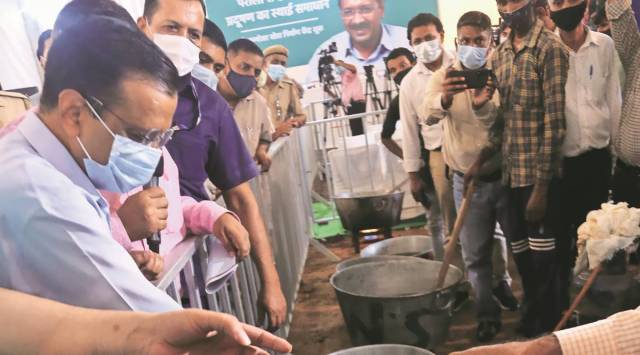- India
- International
Pusa decomposer will cover more land, benefit more farmers this year
After inspecting preparations of the decomposer at the government seed farm in Kharkhari Nahar village near Najafgarh Friday, Chief Minister Arvind Kejriwal said it would be sprayed on fields of 844 farmers this year, up from around 300 last year.
 Kejriwal inspects the preparations last month. (Express Photo: Prem Nath Pandey)
Kejriwal inspects the preparations last month. (Express Photo: Prem Nath Pandey)The Pusa bio-decomposer, which is expected to help decompose stubble left behind after paddy is harvested, will be sprayed on around 4,200 acres of paddy fields in the capital from October 5. The Delhi government has started preparing the solution that will be used.
After inspecting preparations of the decomposer at the government seed farm in Kharkhari Nahar village near Najafgarh Friday, Chief Minister Arvind Kejriwal said it would be sprayed on fields of 844 farmers this year, up from around 300 last year. While it was sprayed only on non-basmati fields last year, basmati fields are also included this year, he said, adding that it can take around 15-20 days for stubble to decompose after spraying. The cost is being borne by the Delhi government.
A third-party audit of the decomposer done by WAPCOS indicated that carbon and nitrogen content in the soil increased as a result of spraying the decomposer, Kejriwal said.
The decomposer, developed by the Indian Agricultural Research Institute (IARI), was sprayed on around 1,950 acres of land as a pilot project last year to prevent the practice of stubble burning to clear the field after a paddy harvest, before sowing the next crop.
Standing under a tent in the village on Friday, around 35 workers used vessels filled with around 25 litres of water each to prepare the solution. The water is boiled with jaggery, allowed to cool, and then mixed with gram flour and capsules containing fungi. The vessels are then covered with muslin cloth for three-four days to allow the fungi to grow. Once sprayed, the microbes in the solution act on the stubble and turn it into compost that can be mixed with the soil.

One acre of land requires around 10 litres of the solution, and it can take around 10 days to prepare the solution.
Farmers in 59 villages in North, Northwest, Southwest and West Delhi have applied to get the decomposer sprayed this year, said A P Saini, Joint Director for Agriculture, Delhi government. Around 14,000 acres of land is under paddy cultivation in Delhi, he said.
To get the decomposer sprayed, farmers had to fill out applications between September 12 and 24. The decomposer is expected to benefit farmers who harvest in ways that leave substantial residue on the field, like using combine harvesters, Saini said.
Some farmers who used the solution last year were happy with the results and intend to use it again. Others like Bhushan Tyagi from Hiranki in Northwest Delhi, who did not get it sprayed last year, chose not to use it this year too: “I took an application form but did not submit it. I harvested paddy around 10 days ago. By the time the decomposer arrives it will be late, since they will only spray it after October 1,” he said.
Tyagi plans on ploughing for the wheat crop around October 25: “It will take at least 10 days to get the spray, and then another 15 days for it to work. Farmers want to harvest, and then leave the field for some time, before ploughing again to ensure a good crop.”
He said he turned the soil and filled the field with water both this year and the last to decompose the stubble, which has made the field fertile. Last year, a rotavator helped to mix the stubble in the soil, and it took around 10 days to decompose, he said.
Indramani Mishra, head of the Agricultural Engineering Department at IARI, said: “The Haryana government has placed orders to spray 1 lakh acres of land with the decomposer, and the Punjab government has also placed orders. Ten manufacturers have been given licences to manufacture the decomposer. The Uttar Pradesh government plans to purchase from a licenced manufacturer.”
Delhi’s Environment Minister Gopal Rai told reporters Friday that more demand for the decomposer is likely, and the government is preparing for extra spraying. At a rate of around Rs 1,000 per acre, around Rs 50 lakh is likely to be spent on making and spraying the decomposer, he said.
Apr 26: Latest News
- 01
- 02
- 03
- 04
- 05









































